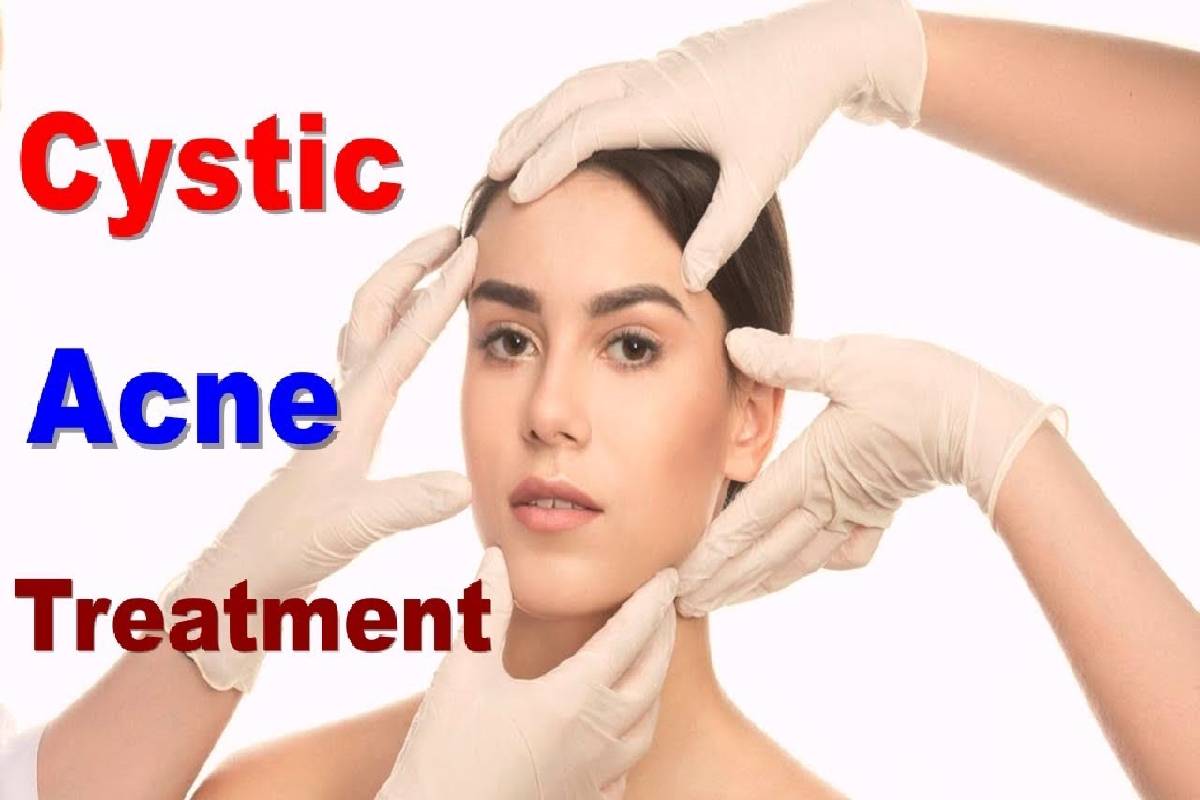
Cystic Acne Treatment – Treatments, Topical Retinoids, and More
Table of Contents
Cystic Acne Treatment
Cystic acne treatment the outbreaks of cystic acne are marked by large, painful pimples that may seem like boils.

Normally, when dead skin cells clog pores, a small spot can develop. If bacteria get trapped there, redness and swelling can also occur.
What is cystic acne?
- The infection penetrates deep into the skin, nodules and cysts can form, generally requiring aggressive treatment by a dermatologist.
- Approximately of the cysts and nodules may contain pus. Cystic acne usually starts on the face, including the jawline.
- But can also appear on the neck, the chest and back. Cystic acne breakouts tend to be greater than acne breakout types.
- This type of severe acne can affect anyone, but it is more common among people with overactive oil glands. Adolescents and women face the greatest risks.
- Hormonal changes, such as the onset of puberty, can lead to cystic acne, as well as other types of skin blemishes. Cystic acne is also more shared among people who have frequent acne breakouts.
Does cystic acne go away?
- The Cystic acne does not go away on its own. Leaving pimples and blemishes alone or using daily cleansers won’t be enough once the breakout becomes severe.
- Nonetheless, a dermatologist can often treat severe acne effectively, as long as you adhere to the treatment plan and administer proper self-care.
- Over-the-counter skin care products can be part of your overall treatment plan.
- Still, strong prescription medications may be needed, along with steroid injections at the blemish site and procedures to drain the abscesses.
- Since a cystic acne breakout can get out of control quickly, it’s best to find a doctor or physician’s assistant specializing in dermatology to begin treatment as soon as possible.
- Severe breakouts can leave stubborn acne scars. Giving acne scars with a combination of laser therapy, coating agents, injections, and other medications can often lead to satisfactory results.
What are Over-the-counter treatments for cystic acne?
In its early stages, cystic acne can respond to over-the-counter treatments. Their efficiency and the time it takes to see results vary considerably, as most topical products have different strengths.
The harshness of your acne and the way your skin cells respond are important and unique factors. These over-the-counter treatments are usually safe to use.
Side effects are typically limiting to skin irritation, but follow directions carefully and consult a doctor or pharmacist using multiple skincare products.
Benzoyl peroxide
- The Benzoyl peroxide is used to treat mild, moderate, and plain acne breakouts. It is considered one of the most reliable and effective treatments.
- In mild cases, it can eliminate pimples in less than a week by speeding up the renewal of skin cells.
- But for severe cystic acne, a combination of benzoyl peroxide and prescription drugs can take a month or more to be effective.
- Benzoyl peroxide is generally using in conjunction with topical antibiotics to control severe acne breakouts.
Retinol
- A procedure of vitamin A, retinol, contains a lower attentiveness of retinoic acid, the active ingredient in many skincare products that helps reduce acne and promotes healthier skin than is found in products.
- Relating prescription drugs are known as retinoids. Consequently, retinol can take longer to produce results, as long as three to six months of daily use.
- Furthermore, to help unclog blocked pores, retinol has anti-inflammatory properties that can help prevent severe acne breakouts from recurring.
Azelaic acid
- As part of a class of dicarboxylic acids, azelaic acid has anti-inflammatory qualities that help reduce swelling and redness.
- It also kills bacteria to help keep pores clean. Daily azelaic acid can take up to four weeks to produce noticeable results in severe acne.
Hydrocortisone
- Nonprescription hydrocortisone cream is a steroid treatment that is much gentler than steroid injections that your dermatologist may recommend for treating severe acne.
- Hydrocortisone can help decrease some of the redness and inflammation associated with cystic acne within a few days. Still, for long-term results, it is most effective when using with other medications.
Prescription treatments
- Major cystic acne breakouts generally require prescription antibacterial medications and other medications to lighten oily skin.
- In some cases, local treatment of prescription steroids is necessary to reduce inflammation.
- Because prescription drugs are so much stronger than over-the-counter treatments, the side effects can also be more serious.
- Be certain to discuss possible side effects with your dermatologist and make sure they know all the cleansers and medications you are using on your skin.
Isotretinoin
- The Isotretinoin is a commonly prescribing retinoid. It originates in a pill and is taking once or twice a day, depending on its strength and the doctor’s recommendation.
- A sequence of Isotretinoin generally takes about four to five months, although some breakouts respond more quickly.
Topical retinoids
- The Retinoids also come in creams and gels for topical treatment. These effective medications include adapalene and tazarotene.
- Its anti-inflammatory properties make topical retinoids effective for treating cystic acne, especially when combined with oral antibiotics.
Spironolactone
- This medication is a share of a class of drugs calling potassium-sparing diuretics. They are generally using to maintain healthy fluid levels and are often prescribing for high blood pressure and heart failure.
- Since it can also affect certain hormone levels, it is also prescribing to women for hormonal acne, which is often characterizing by breakouts along the jawline.
- Taking birth control pills can have alike positive effects on acne and skin health.
- Men are generally not prescribing spironolactone because side effects can include an increase in breast tissue.
Oral antibiotics
- The Oral antibiotics are staples of cystic acne treatment. Utilizing oral antibiotics along with topical treatments may be the best combination to combat cystic acne.
- Amid growing concerns about antibiotic resistance, your dermatologist should carefully monitor the use of oral antibiotics.
- You must take these medications exactly as prescribed without stopping them too soon or taking them longer than necessary.
Steroid injections
- Corticosteroid injections directly into the nodules can help reduce inflammation and help minimize scarring after the skin heals.
- The injections, usually cortisone, can be painful but can lead to noticeable results within a few days, and the pain from the injections will ease quickly.
Also Read: How to Bleach Hair? – Steps to Bleach Hair and More
Also Read: How to Get Rid of a Cold? – Things You Should Know To Get Rid Of a Cold.
- KNOW MORE:- martgos


